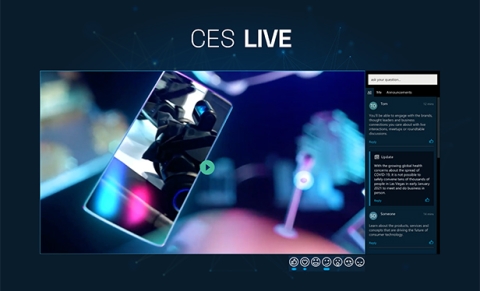CES Paves the Way Forward with Its First Virtual Event

The first fully virtual CES put the spotlight on nearly 2,000 technology companies to see how the future is unfolding. In that regard, and in many other aspects, the event—proclaimed the largest digital industry event ever—was an unqualified success despite moving to an all-digital venue this year.
“CES showed how the pandemic accelerated the arc of innovation and illustrated the resilience and innovative spirit of our industry,” said Gary Shapiro president and CEO of the Consumer Technology Association, the group behind the annual mega-event, in a statement.
As trade shows have been forced online, one of the biggest challenges facing organizations and event planners is effectively showcasing their exhibitors.
While the forum was decidedly different, CES adopted a tried-and-true model to give its companies a forum to the world. Namely, the trade show included dozens of press conferences and sessions allowing exhibitors to display new products and ideas.
As proof of the event’s power, nearly 700 startup companies from 37 countries participated in the virtual show. The range of exhibitors was particularly varied, with household brands one would expect every year at CES represented. These included Intel, LG Electronics, Panasonic, Samsung Electronics alongside nontraditional tech show exhibitors such as AARP, Bridgestone, Caterpillar, Indy Autonomous Challenge, John Deere, L’Oréal, Moen and Procter & Gamble.
“The all-digital format brought new voices to the tech conversation,” noted Karen Chupka, CES executive vice president.
Without question, the pandemic was ever-present throughout the event. Beyond the digital venue powered by Microsoft, the crux of the technology and presentation centered around the rapid innovation spurred by the dramatic shift in how the world is communicating, working and meeting. Key topics covered included:
- Online privacy, trust and security
- The advent of 5G to further enhance digital solutions
- Medical technology
- Advancements in laptops and other devices required to improve global communication and coordination
- How artificial intelligence will further play a role in how we live and work
- Further use and improvements in cloud computing
- And diversity and inclusion—key considerations in the tech field and for virtual and hybrid events going forward.
CES utilized an anchor desk similar to a nightly news broadcast, perhaps a guiding light as companies and organizations adopt hybrid or omnichannel approaches that create different content for in-person and remote attendees.
Meanwhile, the show maintained its star power as Mark Cuban, will.i.am, Ryan Seacrest and other notables participated as speakers and panelists.
“The all-digital CES 2021 engaged the global tech community to experience innovation, make connections and conduct business,” Shapiro said.
Don’t miss any event-related news: Sign up for our weekly e-newsletter HERE and engage with us on Twitter, Facebook, LinkedIn and Instagram!


Add new comment